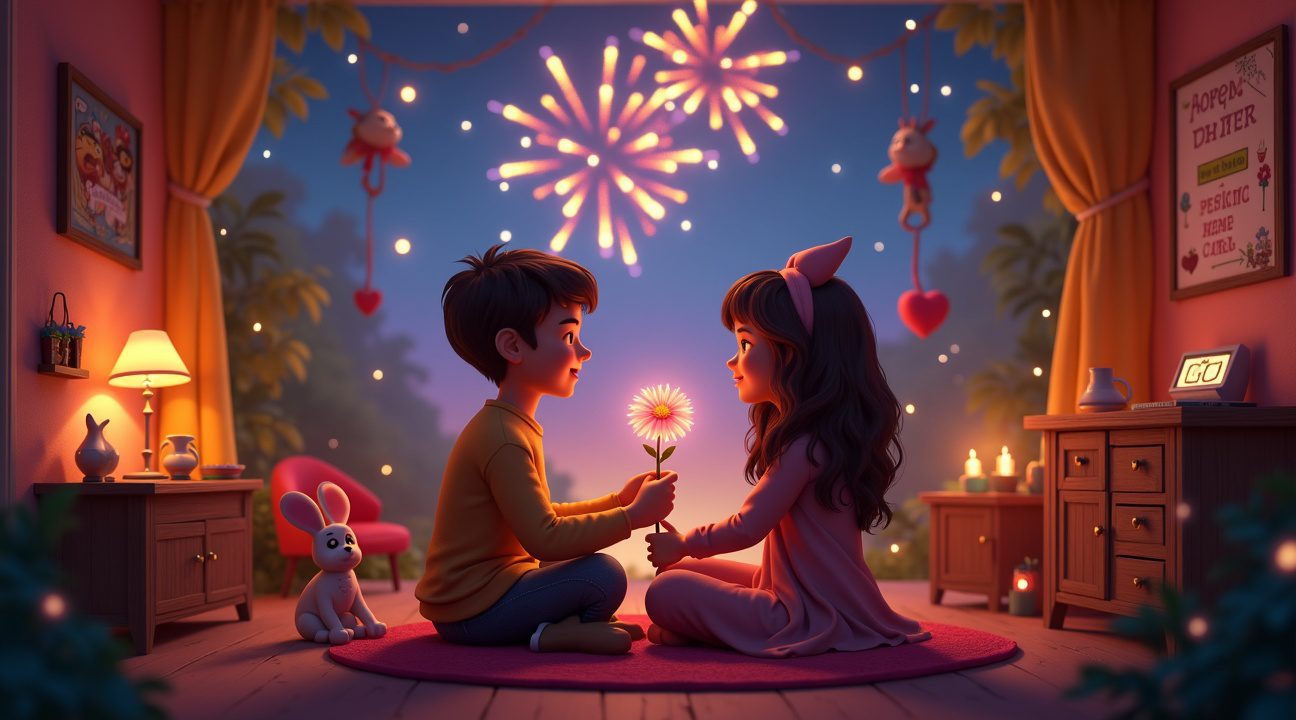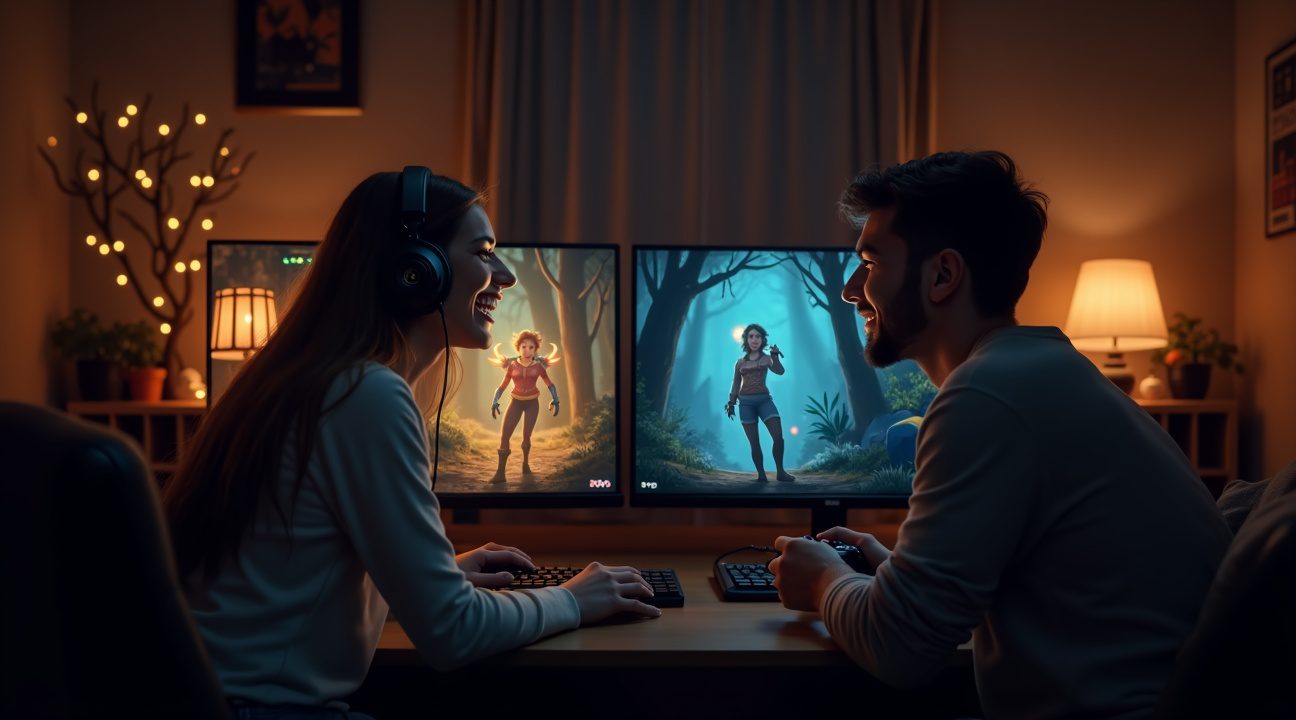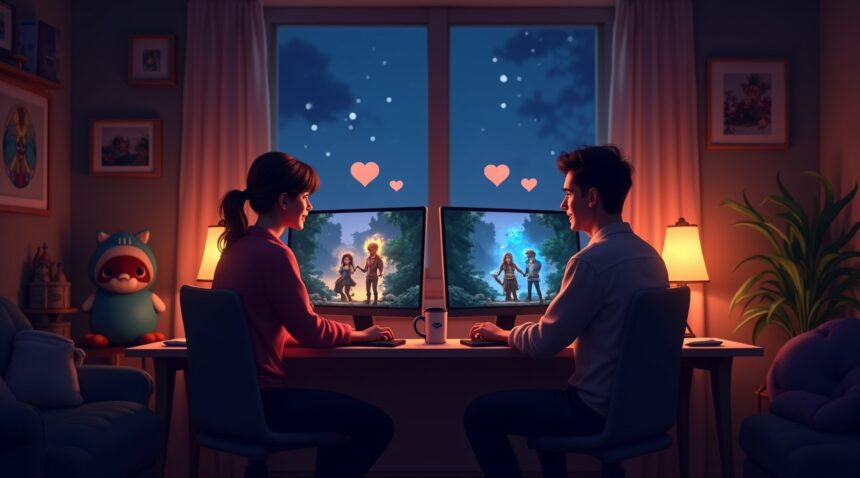Research from the University of Washington shows that multiplayer gaming stands as the top choice for long-distance couples seeking meaningful shared activities. Gaming surpasses passive entertainment like movies in creating emotional connections. The medium generates active engagement through collaboration, communication, and shared achievements that enhance partnership dynamics while offering flexible virtual spaces for genuine interaction.
Key Takeaways
- Active participation beats passive consumption – Gaming demands collaboration, problem-solving, and mutual decision-making that creates stronger emotional bonds than watching movies together.
- Voice chat during gameplay creates intimacy – Real-time communication while gaming lets couples hear each other’s reactions and develop natural conversation patterns that feel more connected than traditional calls.
- Cooperative games build real teamwork skills – Working together on shared objectives in games like It Takes Two or Portal 2 develops trust, communication, and partnership dynamics that transfer to the actual relationship.
- Gaming facilitates social integration – Virtual gaming environments enable partners to naturally meet each other’s friends and build connections with extended social circles regardless of geographical barriers.
- Regular gaming sessions establish consistent connection – Scheduled gaming creates anticipated touchpoints that couples can plan around, providing ongoing conversation topics and shared experiences between sessions.
Why Gaming Works Better Than Movies for Staying Close
Gaming outperforms passive entertainment as a bonding activity for couples separated by distance. When I examine the research from the University of Washington titled ‘Partnership through Play: Investigating How Long-Distance Couples Use Digital Games to Facilitate Intimacy’, the evidence points to multiplayer games as the preferred joint activity for long-distance relationships.
Active Engagement Creates Stronger Bonds
Video games provide active participation that movies simply can’t match. While watching a film together involves shared viewing, gaming demands collaboration, communication, and mutual decision-making. Couples actively work toward common goals, solve problems together, and experience achievements as a team. This interactivity builds emotional closeness in ways that passive consumption never could.
The shared accomplishments in cooperative games create positive memories tied to teamwork. Partners celebrate victories together, strategize through challenges, and support each other during difficult moments. These experiences foster relationship satisfaction because both individuals contribute meaningfully to the outcome.
Gaming Supports Regular Connection Habits
Consistent participation in leisure activities correlates with higher relationship satisfaction according to the University of Washington research. Gaming sessions become scheduled touchpoints that couples can anticipate and plan around. Unlike movies that have defined endpoints, games offer extended engagement opportunities that can adapt to available time.
Multiplayer video games also provide conversation starters and ongoing topics of discussion. Partners can talk about strategies, share gaming experiences with friends, and plan future sessions together. This creates a shared hobby that extends beyond the actual playing time.
Gaming platforms often include voice chat features that encourage natural conversation during play. Couples communicate constantly while gaming – calling out enemy positions, discussing tactics, or simply chatting about their day. This consistent communication supports relational maintenance in ways that sitting silently through a movie cannot achieve.
The sense of accomplishment from completing game objectives together builds partnership dynamics. Each victory reinforces the couple’s ability to work as a team, creating positive associations with their collaborative efforts. Research shows people increasingly prefer gaming over traditional entertainment, making it a natural choice for couples seeking engaging shared activities.
Joint gaming sessions also offer flexibility that movie watching doesn’t provide. Couples can pause, take breaks, or adjust difficulty levels based on their moods and energy levels. This adaptability makes gaming more accommodating to the varying schedules and time zones that challenge long-distance relationships.
Gaming Creates Virtual Date Nights and Emotional Connection
Online gaming functions as a ‘third place’—an informal digital environment where couples can socialize and bond beyond conventional methods like calls or texts. This virtual space offers something unique that traditional communication can’t replicate: a shared interactive experience that feels more like being together than apart. Video games have positive impacts on relationships by creating opportunities for meaningful connection through shared adventures and achievements.
Transforming Routine Interaction Into Meaningful Moments
Long-distance couples discover creative ways to use in-game features for expressing affection and spending intentional time together. They customize avatars to represent their relationship, embark on shared quests that require teamwork, and celebrate victories as a united team. These activities transform what could be mundane gaming sessions into genuine date nights filled with laughter, collaboration, and emotional intimacy.
The beauty lies in how these couples repurpose game mechanics for romantic expression. They might build virtual homes together in simulation games, coordinate matching outfits for their characters, or create secret meeting spots within game worlds. These gestures become their own language of virtual affection, replacing physical touch with thoughtful digital expressions that carry equal emotional weight.
Cooperative Gaming Builds Stronger Partnership
Cooperative games that involve joint goals cultivate a greater sense of shared experience and partnership than competitive games. When couples work together against computer-controlled challenges rather than competing against each other, they develop teamwork skills that translate into their real relationship. They learn to communicate effectively under pressure, support each other through difficult moments, and celebrate shared victories.
These collaborative experiences create several powerful bonding opportunities:
- Partners develop trust by relying on each other to complete challenging objectives
- They practice problem-solving together when facing difficult game scenarios
- Shared achievements create positive memories that strengthen their emotional connection
- Regular gaming sessions establish consistent quality time despite physical distance
- Overcoming in-game obstacles together builds confidence in handling real-life challenges
The cooperative mechanics force couples to communicate clearly, coordinate their actions, and support each other’s strengths while compensating for weaknesses. This dynamic mirrors healthy relationship patterns and reinforces positive interaction habits that benefit their overall partnership.
Through these interactive experiences, couples simulate real-life shared rituals that help offset the absence of physical togetherness. Gaming addresses real-world challenges by providing structured ways for distant partners to maintain intimacy and connection. The scheduled nature of gaming sessions creates anticipated events that both partners can look forward to, similar to traditional date nights.
The emotional connection deepens because gaming requires active participation from both people simultaneously. Unlike watching movies together online or having phone conversations, gaming demands engagement, decision-making, and mutual support. This active involvement creates stronger memories and more meaningful shared experiences than passive activities.
Gaming sessions also provide natural conversation starters and ongoing topics to discuss between sessions. Couples find themselves planning strategies, discussing character development, or reminiscing about memorable gaming moments during their separate daily routines. This continuous thread of shared interest keeps them connected even when they’re not actively playing together.
The virtual environment removes many barriers that might exist in face-to-face interactions, allowing some couples to express themselves more freely through their avatars. Shy partners might find it easier to be playful or adventurous in-game, while others appreciate the focused attention that gaming requires from both participants. Research shows people increasingly prefer gaming over passive entertainment, suggesting that interactive experiences provide more satisfying engagement than traditional media consumption.
The structure of most games naturally creates milestones and goals that couples can pursue together, giving their relationship a sense of forward momentum and shared purpose. Whether they’re leveling up characters, unlocking new areas, or completing challenging raids, these achievements become symbols of their partnership’s growth and resilience.

Voice Chat and Shared Wins Strengthen Your Bond
The Intimacy Factor in Gaming Communication
Voice chat transforms gaming from a basic activity into an intimate bonding experience. When partners hear each other’s laughter, excitement, and even frustration during gameplay, they create emotional connections that text messages simply can’t replicate. I’ve observed how couples who prioritize voice-enabled games report feeling closer to their distant partners compared to those who rely solely on typed conversations.
Co-op games with shared objectives mirror real-life teamwork dynamics that couples experience when living together. Partners who tackle challenging boss battles or solve puzzles collaboratively develop the same trust and communication patterns they’d use when assembling furniture or planning a vacation. This virtual collaboration helps bridge the emotional gap that physical separation creates.
Gaming’s inherent flexibility makes it perfect for different relationship styles and schedules. Some couples thrive on daily gaming sessions, turning their evening calls into shared adventures through fantasy worlds. Others prefer weekend gaming marathons or occasional special events that become anticipated highlights of their relationship. Video games shape individuals in profound ways, and this extends to how they connect with loved ones.
Shared accomplishment creates psychological bonds that strengthen relationships beyond the gaming session itself. When partners celebrate defeating a difficult raid boss or completing a challenging level together, they’re experiencing genuine teamwork success. These victories become shared memories that couples reference long after logging off, creating inside jokes and nostalgic moments that enrich their relationship.
The psychological benefits of achieving goals together can’t be overstated. Research shows that couples who work toward common objectives develop stronger emotional connections and better communication skills. Gaming provides an accessible platform for this type of collaboration, especially when physical proximity isn’t possible.
Voice communication during gameplay also allows partners to learn each other’s problem-solving approaches and stress responses. I notice how one person might approach challenges methodically while their partner prefers quick, intuitive decisions. These insights translate into better understanding during real-life discussions and conflicts.
Games tackle real-world problems including relationship maintenance across distances. The combination of voice chat and shared objectives creates an environment where couples can maintain emotional intimacy while having fun together. This dual benefit makes gaming sessions feel productive rather than just entertaining, helping justify the time investment for busy couples managing long-distance relationships.
Virtual communication through gaming often feels more natural than traditional video calls because the shared activity reduces pressure to constantly maintain conversation. Partners can communicate organically as situations arise in the game, creating a more relaxed atmosphere for connection.

Meeting Each Other’s Friends Through Gaming
Gaming creates unique opportunities for long-distance couples to naturally integrate into each other’s social circles. Unlike traditional meetups that require physical presence, virtual gaming environments allow partners to participate in group activities with their significant other’s friends regardless of geographical barriers. I’ve observed how multiplayer games serve as social bridges, enabling couples to build genuine connections with extended friend networks that might otherwise remain separate.
Building Social Capital Through Virtual Interactions
Gaming platforms excel at fostering both bonding and bridging social capital within relationships. During significant disruptions like the pandemic, social gaming became a lifeline for maintaining existing friendships while simultaneously helping couples meet new people. These virtual spaces provided consistent opportunities for interaction when traditional socializing methods weren’t available. The shared experiences created through cooperative gameplay often translate into stronger offline relationships and deeper understanding between partners and their respective friend groups.
Creating Comfortable Spaces for Connection
Virtual gaming environments offer particular advantages for individuals who identify as emotionally sensitive or naturally shy. These platforms provide structured activities that reduce social pressure while encouraging authentic interaction. Rather than forcing awkward small talk, games create natural conversation starters through shared objectives and experiences. The following benefits make gaming especially effective for social integration:
- Reduces initial social anxiety through focus on gameplay rather than direct social pressure
- Provides common ground and shared experiences that facilitate bonding
- Allows gradual relationship building over multiple gaming sessions
- Creates memorable moments that strengthen group dynamics
Research from diary studies reveals that 77% of couples identify gaming as their primary method for meeting their partner’s friends and achieving greater social integration. This statistic underscores how video games shape individuals and their social connections in meaningful ways. Gaming doesn’t just entertain—it actively builds the social infrastructure that supports healthy long-distance relationships.
Virtual worlds remove many barriers that typically complicate friend group integration. Time zone differences become manageable when gaming sessions can accommodate various schedules. Geographic distance loses relevance when everyone shares the same digital space. These advantages help couples maintain stronger connections with both their own friends and their partner’s social circles, creating a more unified support network that benefits the relationship as a whole.
Best Games for Long-Distance Couples
Choosing the right games can transform how couples connect across distances. I’ve found that different game types serve unique purposes in strengthening relationships, whether partners want intense cooperation or casual entertainment.
Cooperative Games That Build Teamwork
Cooperative games excel at bringing couples together through shared challenges. It Takes Two stands out as a masterpiece designed specifically for couples, requiring constant communication and collaboration to progress. Players must work in perfect harmony, making decisions together while solving creative puzzles that mirror real relationship dynamics.
Portal 2 offers another exceptional cooperative experience, challenging couples to think critically together while maintaining constant dialogue. The game’s puzzle mechanics demand trust and clear communication, skills that translate directly to stronger relationships. Stardew Valley provides a more relaxed cooperative environment where couples can build a virtual farm together, planning seasons and sharing daily tasks that create a sense of domestic partnership.
Overcooked brings couples together through chaotic kitchen management, testing their ability to coordinate under pressure. While potentially frustrating, the game teaches patience and teamwork in high-stress situations, often resulting in laughter and stronger bonds.
Multiplayer Online Worlds for Ongoing Connection
MMOs and larger multiplayer games create persistent worlds where couples can build lasting virtual relationships. Animal Crossing: New Horizons allows partners to visit each other’s islands, share resources, and participate in seasonal events together. The game’s gentle pace and creative focus make it perfect for couples who want to express themselves artistically while staying connected.
Minecraft offers unlimited creative potential, enabling couples to build entire worlds together. Whether constructing elaborate structures or exploring dangerous caves, the game provides endless opportunities for shared adventures. Partners can work on long-term projects that require weeks or months to complete, creating ongoing reasons to reconnect regularly.
Final Fantasy XIV presents a more traditional MMO experience where couples can quest together, join guilds, and participate in large-scale raids. The game’s rich storytelling and character progression systems give couples shared goals and achievements to celebrate together. These positive gaming experiences often extend far beyond the game itself, creating lasting memories and inside jokes.
Casual and Mobile Games for Everyday Fun
Casual mobile games remove barriers that might prevent less experienced gamers from participating. Mario Kart Tour brings competitive racing to smartphones, allowing couples to race against each other during lunch breaks or commutes. The game’s simple controls and familiar characters make it accessible to players of all skill levels.
Words With Friends transforms the classic Scrabble experience into an ongoing conversation starter. Couples can play multiple games simultaneously, sending messages with each move to maintain constant communication throughout busy days. This asynchronous gameplay style accommodates different schedules while keeping partners connected.
Jackbox Party Pack games work perfectly for couples who want to include friends or family in their gaming sessions. These party games require only smartphones and a shared screen, making them ideal for virtual double dates or family game nights. The variety of games within each pack ensures couples can find activities that match their humor and interests.
Adventure and Puzzle Games for Shared Experiences
Adventure and puzzle games create opportunities for couples to solve problems together while experiencing compelling narratives. These games often feature branching storylines where couples must make decisions together, leading to discussions about values and preferences that strengthen understanding between partners.
The key to successful gaming relationships lies in choosing titles that match both partners’ interests and skill levels. Gaming preferences vary significantly between individuals, so couples should experiment with different genres to find their perfect match. Starting with simpler games and gradually introducing more complex experiences helps build confidence and shared gaming vocabulary.
Regular gaming sessions create anticipated moments of connection that couples can look forward to throughout their weeks apart. These shared virtual experiences often tackle real relationship challenges by providing safe spaces to practice communication, compromise, and collaboration skills that strengthen bonds both online and offline.
When Gaming Goes Wrong in Relationships
Gaming can create friction between long-distance partners when the experience becomes unbalanced or doesn’t address both people’s needs. I’ve seen relationships suffer when one partner dominates the gaming sessions while the other feels left behind or unengaged.
The Problem with One-Sided Gaming
Relationship satisfaction takes a significant hit when gaming becomes a one-sided affair. Research shows that couples experience declining connection when only one partner drives the gaming experience or when games fail to accommodate different skill levels. This asymmetry creates frustration and can make gaming feel more like a chore than a bonding activity.
Gender-based preferences often contribute to this disconnect. Men frequently prioritize achievement-focused gameplay, seeking challenges, competition, and measurable progress. Women, on the other hand, tend to value relational play that emphasizes communication, cooperation, and shared storytelling. When couples choose games that only cater to one of these approaches, the other partner may feel excluded or uninterested.
I recommend couples address these differences by selecting games that support multiple playstyles within the same experience. Look for titles with collaborative mechanics that allow both competitive and cooperative elements to coexist. Games like “It Takes Two” or “Portal 2” excel at this balance, offering puzzle-solving that requires communication while still providing individual moments to shine.
Bridging the Gap Through Better Design
The gaming industry has started recognizing the unique needs of long-distance couples, leading to innovative solutions that address common relationship gaming problems. Developers are creating platforms specifically designed for LDRs that go beyond traditional multiplayer experiences.
Some emerging technologies focus on physical sensation and shared memorabilia to enhance emotional connection. These include:
- Haptic feedback devices that let partners feel each other’s presence during gameplay
- Synchronized gaming accessories that create shared physical experiences
- Digital platforms that generate and store couple-specific gaming memories
- Games that automatically adjust difficulty levels to accommodate skill differences
Future developments show promise for even more relationship-focused features. In-game tokens could allow partners to leave meaningful messages or gifts for each other, while digital memory books could automatically capture and preserve special gaming moments between couples.
These design implications extend beyond simple feature additions. Games designed for long-distance relationships need to consider timing flexibility, communication integration, and emotional safety. Partners in different time zones need asynchronous elements, while those with varying gaming experience levels need adaptive difficulty systems.
I suggest couples experiencing gaming-related relationship issues evaluate whether their chosen games accommodate both partners’ preferences and skill levels. If current games aren’t working, explore newer platforms designed specifically for couples or try games with adjustable difficulty settings and multiple engagement styles.
The key lies in recognizing that successful relationship gaming requires intentional choice and ongoing communication about what each partner enjoys and needs from the experience. When both people feel valued and engaged in the gaming process, it becomes a powerful tool for maintaining and strengthening long-distance connections rather than a source of frustration or disconnection.
Sources:
Partnership through Play: Investigating How Long-Distance Couples Use Digital Games to Facilitate Intimacy (Devasia et al., 2025, University of Washington)
PMC9047596
PMC4080869
How Video Games Help People Connect – JCFS Chicago


